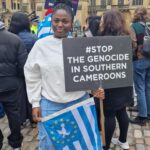The ongoing civil crisis in the area called Sothern Cameroons, a former British trust territory, can be traced back in 1961 when the British failed to grant Southern Cameroons the right to be independent and rather gave them an option in a plebiscite to join Nigeria or La Republic du Cameroun. This travesty of justice of the right of a people to self-determination has had a tremendous impact over the years till now. The people of Southern Cameroons might be described as victims of an imperfect decolonisation which started with the decision to refuse them self autonomy by the British.
Consequently, there has been a consistent and systematic governing machinery in place which ensures that the former British Southern Cameroons remain subjected under La Republique du Cameroun as opposed to sharing equal status as federated states in power relations. This was evident in 1972 when the first President, Ahmadou Ahidjo changed the name of the country from The Federal Republic of Cameroon to The United Republic of Cameroon. When his predecessor, Paul Biya took over in 1982, he also unilaterally changed the name to the Republic of Cameroon. These worrying patterns of gross violation of the constitution binding La Republique du Cameroun and the British Southern Cameroons show complete disregard of the people’s wishes.
The Southern Cameroons National Council (SCNC) was created from the
backdrop of such disgruntlements and after all failed attempts to get La Republique du Cameroun to reconsider their moves in undermining the constitutional position of the British Southern Cameroons as equal patterns in the political affairs of the country.
The SCNC has consistently stood for the independence of the former British Southern Cameroons through public activities such as peaceful protest and demonstrations. Over the years members of the SCNC have been subjected to wanton arrest and human rights violations. In 2021, Amnesty International Report on Cameroon found that security forces continue to disrupt SCNC activities.
This flagrant disregard for basic human rights is an ongoing happening in Cameroon particularly seen in 2016 when Teachers and Lawyers went on the street to protest the use of French in English Schools and Courts. They were met with humiliation, harassment, torture, detention and persecution.
The outlawing of the SCNC and the Cameroon Civil Society members of the
consortium is an apt example of a society that denies its citizens the right to freedom of speech, life and movement. An example is the case of Fabian Fomuki, a US citizen detained in Cameroon for more than three months. His support for the restoration of Southern Cameroons independence whilst residing in Canton, USA is the reason for his arrest according to his family. He arrived in Cameroon via the Douala international airport and was arrested at his hotel when a group of
masked men armed with guns abducted him, threw a bag over his head, and loaded him into a car.
This worry pattern of arbitrary arrest, harassment, and detention of SCNC supporters is entirely at odds with international human right law and standards.
The ongoing crisis has created a humanitarian crisis particularly as British Southern Cameroonians have had to seek refuge in neighbouring Nigeria and are in dire need of necessities such as food, shelter, and healthcare. The mental well-being of the British Southern Cameroonians in exile are in jeopardy and their existence is hanging in the balance as they wonder when they will return home again.
We call on the UK government to mediate with other international bodies to find lasting solutions to the ongoing genocide and unrest in the British Sothern Cameroons. We wish to plead our course for the complete restoration of the independence of the British Southern Cameroons. As SCNC members, we will continue to advocate our rights to freedom and restoration of that which had denied us in 1961. Although we are a people as Achille Mbembe describes made
up of an ‘entanglement with multiple elsewhere[s]… that has produced different outcomes,’ we assert that we are on a long journey to freedom, of becoming an independent country and we look forward to reaching Buea.
Written By: Emilia Efeti Agey

